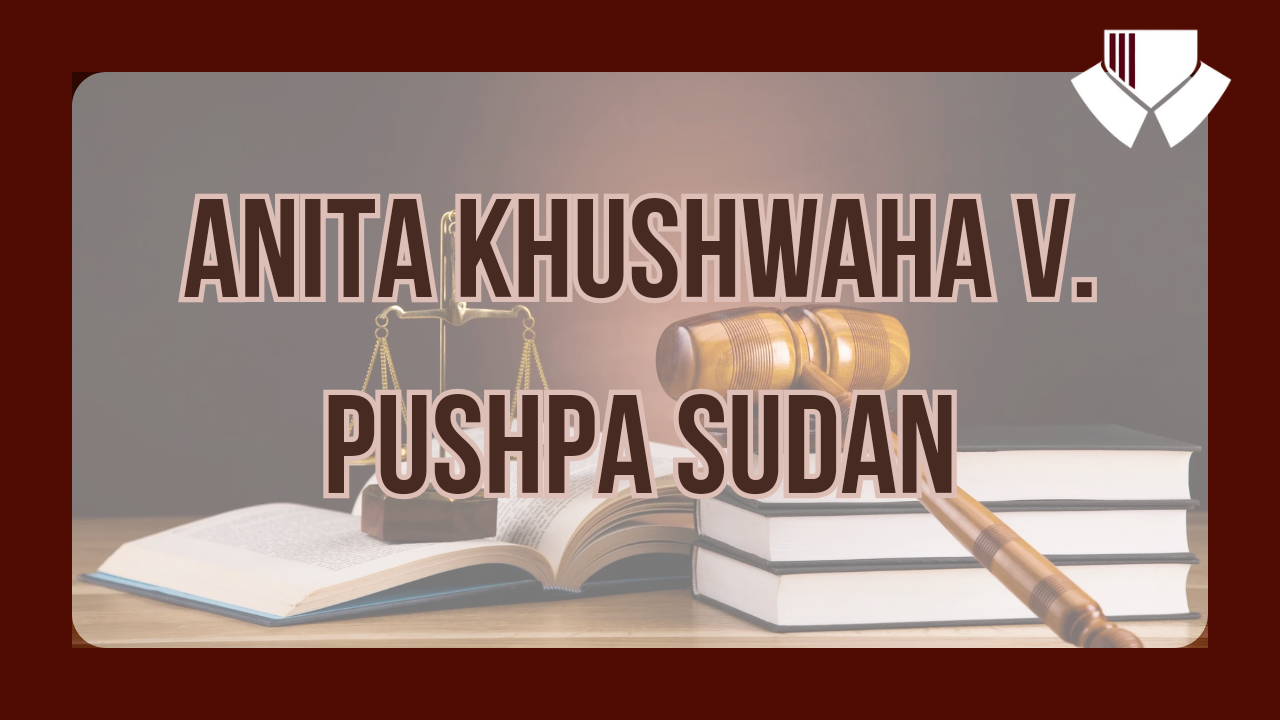This case analysis is written by Sohini Chakraborty, a 3rd year law student of Amity University, Kolkata.
CITATION: 1343 of 2008
COURT JUDGES: Justice S. Thakur, Justice Fakkir Mohamed, Justice R. Banumathi, Justice A.K. Sikri, Justice S.A. Bobde
PETITIONER: Anita Kushwaha
RESPONDENT: Pushpa Sudan
BACKGROUND OF THE CASE:
The recognition and enforcement of access to justice as a fundamental and inalienable human right is a result of various legal documents and declarations, including the Magna Carta, the Universal Declaration of Rights, the International Convention on Civil Rights, 1996, the ancient Roman Jurisprudence maxim of “Ubi Jus Ibi Remedium,” and the development of fundamental principles of common law through judicial pronouncements made by courts over centuries ago.
The transfer of cases in accordance with Article 21, Article 39 A, and other constitutional provisions has been defended by the Honorable Court. The judiciary has even proclaimed that Article 21 of the Constitution guarantees access to justice and a speedy trial. The Hon’ble Court emphasized that the foundation for the development of the legal system is the protection of public policy and the administration of justice. If the transfer of cases is accomplishing the goal of the legal system’s establishment, it becomes crucial.
Before 1947, a Hindu Maharaja ruled over Jammu and Kashmir, a princely kingdom under British Paramountcy. The princely state leaders were offered to join one of the two newly formed nations when the British Paramountcy ended. The Maharaja of Jammu and Kashmir made the decision to join India only after their state was granted special status. The state of Jammu and Kashmir has been granted significant significance in our Constitution. Generally, a law passed by the legislature does not apply to the state of Jammu and Kashmir. Jammu and Kashmir’s special status is established by Article 370. It’s a contentious and divisive political issue. Although the entire country wants Jammu and Kashmir to become just another state in India, the people living there want to be treated differently.
ISSUES
- Whether the Indian Constitution recognizes access to justice as a fundamental right?
- Whether the cases from Jammu and Kashmir can be transferred to other states by the Supreme Court and vice versa?
- Whether the Supreme Court is prohibited by Article 32 and Article 142 of the Constitution from transferring matters from J & K to other states and vice versa by Section 25 of CPC and Section 406 of Cr. P.C?
CONTENTIONS OF THE PETITIONER:
- The petitioner expressed satisfaction that the Court retains the authority to order the transfer of cases, even in circumstances where Central Legislation does not apply to the State of Jammu & Kashmir.
- The petitioner argued that neither Section 25 of the CPC nor Section 406 of the Cr.P.C., which apply to the rest of the nation, apply to the state of Jammu and Kashmir and that neither of the aforementioned codes expressly or implicitly forbade the Supreme Court from exercising its power of transfer under the Indian Constitution.
- Additionally, it was argued that provided the power of transfer is otherwise permitted by the Constitution, the lack of enabling language in the state law of civil and criminal procedure does not automatically mean that this Court cannot use it. Due to the 42nd Amendment Act’s non-expansion to the state of Jammu and Kashmir, Article 139A is applicable to that state. However, this does not mean that exercising the power of transfer is prohibited, even if it could be traced back to another constitutionally recognized source.
- the petitioner has maintained that access to justice is a human right guaranteed by Article 39A of the Constitution and that it can be interpreted in accordance with Article 21 of the Constitution.
CONTENTIONS OF THE RESPONDENT:
- One argument made was that the State of Jammu and Kashmir is exempt from the provisions of Article 139 A of the Constitution.
- It was stated that in the absence of any enabling provisions, a plaintiff does not have the authority to transfer matters from J&K to another state or vice versa.
- In opposition to the transfer petition, the Respondent argued that the provisions of Section 25 of the CPC and Section 406 of the Cr.P.C., which give this court the authority to order the transfer of criminal and civil cases from one state to another, respectively, do not apply to the State of Jammu and Kashmir and cannot be used to order any such transfer.
- The contention was also made that the Jammu and Kashmir CPC, 1977, and Jammu and Kashmir Cr. P.C., 1989, does not even permit the aforementioned transfer.
JUDGEMENT:
Magna Carta and common law both contributed to the development of the idea of access to justice, which is an essential human right and is acknowledged as such in the majority of constitutional democracies. An essential right to access courts is established by the Magna Carta. The Court decided that under Article 139 A of the Constitution, the authority to transfer the cases is not absolute. The Court noted that if the requirements under Article 139 A are met, the litigant may request a transfer of proceedings. The broad authority granted to this court by Articles 136 and 142 of the Constitution was not meant to be affected by the aforementioned Article, nor does it function in that manner. The court believes that in order to carry out the noble intentions outlined in Articles 136 and 142(1), it is important to extend the authority of withdrawal and transfer of cases to the Apex Court. Therefore, it is imperative that the authority granted by Article 139A be maintained indefinitely.
The authority granted by Article 142 is of a completely different caliber and magnitude. Ordinary law restrictions, limitations, and requirements do not automatically operate as restrictions on the constitutional authority granted by Article 142. The prohibitions or limitations found in the statutes may provide the framework of a certain law, considering the type of authority or court on which the power is being conferred and how best to limit it. It’s possible that the restrictions don’t always represent or stem from any core public policy principles.
CONCLUSION:
However, it cannot be interpreted that the lack of an enabling statute forbids the transfer of cases to or from the State of Jammu and Kashmir. A prohibition simpliciter is insufficient, in any case. Thus, the Court may find it useful to exercise the extraordinary authority granted by Article 142 of the Constitution in cases where it is convinced that refusing an order of transfer from or to the State of Jammu and Kashmir will deprive the citizens of their right to access justice. Since the Central Code of Civil and Criminal Procedure does not apply to the State and neither do the State Codes of Civil and Criminal Procedure contain any provisions enabling this court to transfer cases, the provisions of Articles 32, 136, and 142 are sufficiently broad to enable this court to order such a transfer in appropriate circumstances. As a result, we responded in positively to the query posed to us. No state is barred from India because of its special status. Therefore, they should likewise have access to Article 32’s remedy or any other similar provision.


